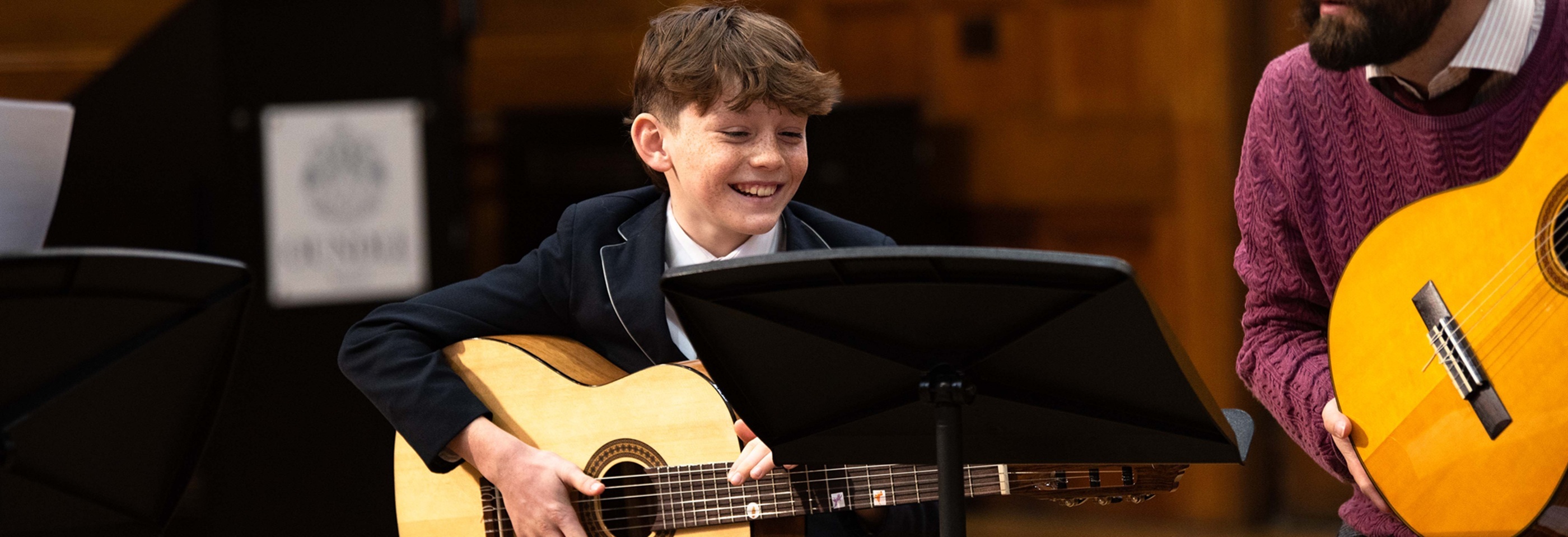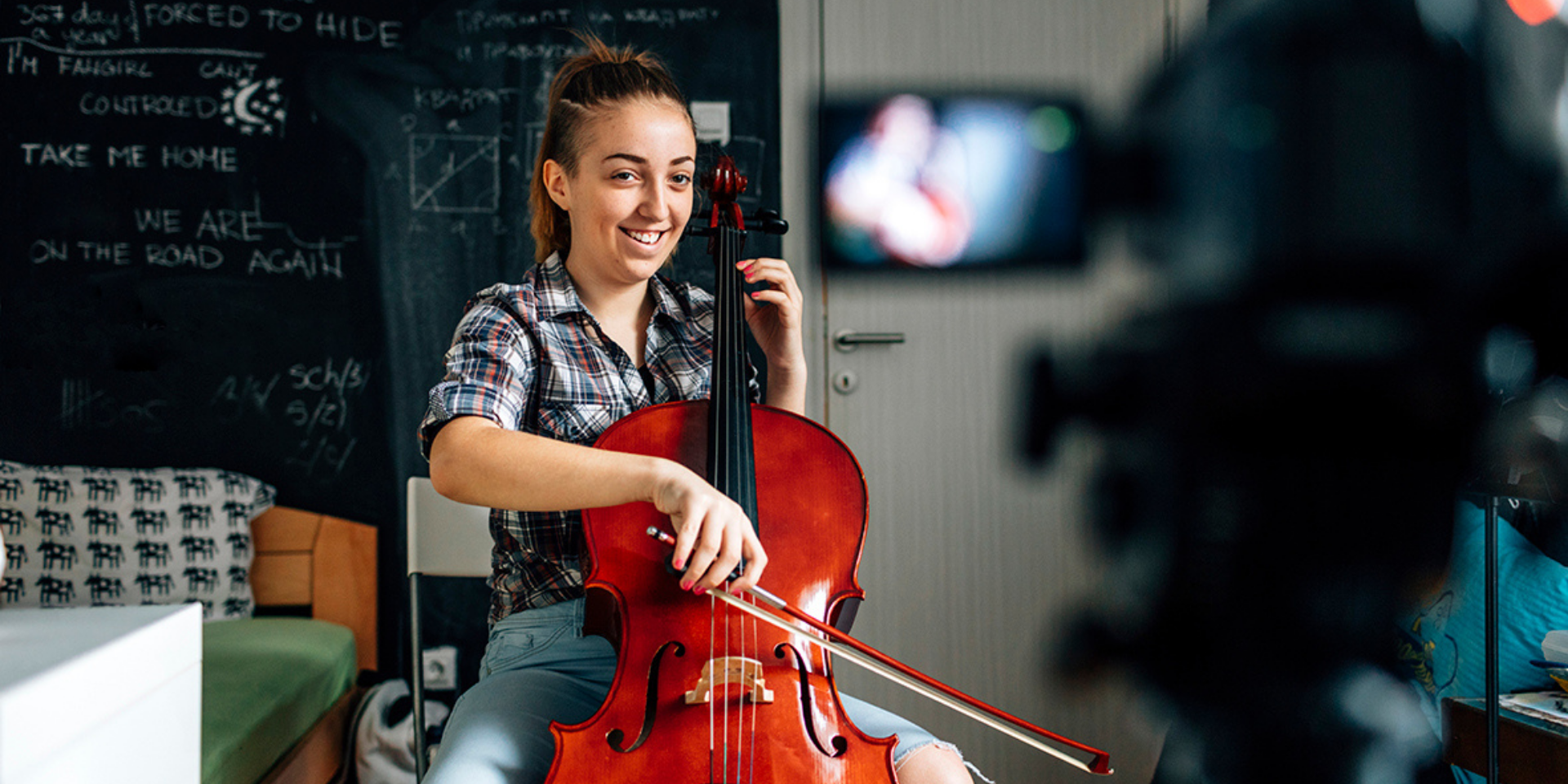
Using Trinity College London music exams and performance to empower young people
BY: Guest Writer
26 November 2025
Whether you refer to them as ‘soft’, ‘core’, ‘essential’ or ‘power’ skills, there is no denying that the benefits of learning to play a musical instrument extend far beyond musicianship. Music education has long been attributed to the improvement of cognitive skills, language development and academic performance; the building of confidence, social skills, discipline and patience; and can have health benefits, both as a way of managing mental health, and preserving brain functionality into later life. In this blog, we hear from two Trinity Champion Centre representatives who share their experiences of supporting students with the development of these skills alongside preparing for Trinity exams.
Nina Haynes, Head of Music at Laxton Junior School
At our school, music is more than just a subject; Music is a journey of self-discovery, shared experience, and creative expression. As music educators, we believe deeply in nurturing each child’s individual growth while also encouraging them to play, perform, and grow together. Trinity College London’s music exams have become an essential part of that journey for us, offering a structured yet flexible pathway that supports every pupil. During the 2024-25 academic year, we proudly entered 111 pupils from Year 2 to Year 6 for Trinity music exams across a range of instruments. We’re thrilled that 51% achieved a Merit, while 34% of them achieved a Distinction. But it’s not just about the results; what we value most is the process and how this can help children develop.
Trinity’s graded exams provide our pupils with a clear and meaningful structure that supports their musical development. It gives purpose to each practice session, helps break progress down into manageable steps, and provides a clear goal to work towards. We’ve seen how motivating this can be. Pupils take ownership of their learning, become more self-reflective, and develop greater perseverance. The feedback they receive after the exam is constructive and affirming, giving them clear ways to improve while celebrating their progress so far. To make the exam experience as positive and successful as possible, we carefully plan three exam sessions each year, in December, March and June. This gives our pupils flexibility and allows us to tailor preparation to each individual. Preparation is more than just learning pieces; our teachers offer extra support where needed, and we create frequent opportunities for pupils to perform their exam pieces in front of peers, teachers, and sometimes even parents.
Performance plays a vital role in our preparation for Trinity exams. We’ve found that, by embedding performance into our musical culture, pupils approach their exams, not with fear, but with excitement and a strong sense of readiness. These performance opportunities are invaluable as they build confidence, help reduce anxiety, and allow pupils to experience the sense of achievement that comes from playing for an audience. We carefully plan a range of different performance opportunities throughout the year, from informal, low-pressure ones that help children build confidence and stage presence, while also having more formal performances, like our annual House Music event.
What we’ve seen over time is that Trinity exams have become part of a wider culture of growth in our music department. They’re not just a test of skill, but a celebration of progress, commitment, and musical joy. Whether a child is working towards their first Initial exam or tackling the challenges of Grade 5, the sense of achievement they gain is real and lasting. For many of our pupils their music exam is a place where they can succeed and be recognised. That’s something worth championing.
Charlotte Gernet, Director at Act II Theatre Company
Running a youth theatre company with young people aged up to 18, I see a host of different children from many walks of life, all joining together with a shared love of music and performance. Unfortunately, I all too often see children struggling with anxiety and fragile mental health - using extracurricular music and drama as a form of escape has never been more important.
A couple of years ago we had a parent enquire about her daughter joining Act II. The daughter was suffering with severe anxiety and was on a reduced timetable at school. Her Mum had studied performance and understood what the benefits would be. She was keen for her to find an outlet with music and drama to help build her confidence and ‘find her tribe’.
Initially she was nervous but throughout the year we gradually saw her making new friends, volunteering to perform in front of the class and auditioning for shows. Last September she added our Trinity Rock & Pop Vocals classes to her timetable. To begin with she would sing quietly, not wanting to make any mistakes or let others hear her too much. Through the support of her group (we teach up to Grade 5 in small groups of a maximum of 6 people) she has blossomed: grabbing the microphone and singing with heart and passion. We teach Trinity music theory alongside all of our singing classes, something else she started from scratch in September. She surprised me just 6 months later when she said she wanted to push forward with her theory and take her Grade 1 in May. Through a lot of hard work and self-motivation she earned a Distinction, and I have never seen her look so proud. We are now also awaiting her result for her Grade 2 Rock & Pop Vocals, in which I have no doubt she has excelled. Working towards and gaining these qualifications has given her something to work towards: driving her development and giving her a huge sense of achievement. She has masses of confidence now and I see her regularly supporting others during classes.
She auditioned for our production of ‘School of Rock’ and was cast as Katie – a role which would also require her to learn to play bass guitar. The girl who first started with us would not have put herself forward in such a way but a few months ago she wowed everyone on stage with sass, conviction and talent. She is continuing to play bass guitar, and I wonder whether a Rock & Pop Bass exam might be next…
Did you know that you can celebrate your students’ stories of growth and personal development by nominating them for Trinity’s Hall of Fame? Click here to find out more.




Comments & Replies